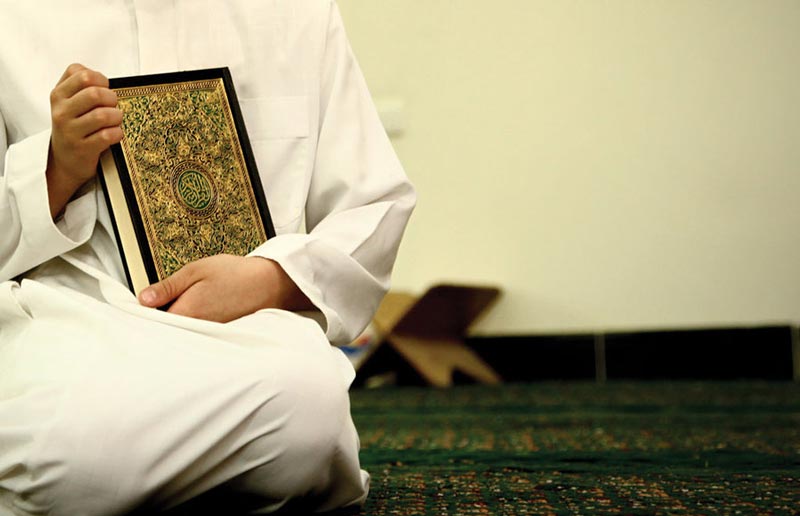“Contemplation” or “Tafakkur” in Quran and hadith

One of the important actions in Islam, that has came as an Ibadaa, is “Tafakkur” or contemplation.
The beauty of Islam is that it does NOT ONLY consist of Instructions but also invites its followers to contemplate, to reflect and to think.
Contemplation is the source of Islamic spirituality – contemplative spirituality – which is received through a thinking process rather than the cessation of intellectual activity. In fact, the process of contemplation or tafakkur and tadabbur as mentioned in the Quran, is the beginning of all sorts of spiritual activity.
The question that arises here is: What should we contemplate and think about?
Firstly, to contemplate about the creations of Allah (SWT).
“How many a sign there is in the heavens and the earth that they pass by while they are disregardful of it”
(12:105)
Contemplating on the creations of Allah (SWT) has many advantages. One of the most important things is that that it leads us to recognize our Creator. If we recognize Him, we will obey Him;
And if we obey Him, we will achieve success in this world and in the Hereafter.
Miqdad was one of the close friends of Imam ‘Ali (as). Once he heard a companion of the Holy Prophet (saww) saying that the Holy Prophet (saww) has said: “Contemplating for an hour is better than the worship of one year”.’ He then heard another companion saying that the Holy Prophet (saww) has said, “Contemplating for an hour is better than seven years of worship”. He then again heard from the third companion saying that the Holy Prophet (saww) said, “Contemplating for an hour is better than seventy years of worship”. Not knowing which Hadeeth was true, Miqdad came to the Holy Prophet (saww) and informed him of the three different versions of his Hadeeth that was being quoted by his companions.
The Holy Prophet (saww) informed him that all the three are correct. In order to prove his point, the Holy Prophet (saww) summoned all the three men.
He (saww) asked the first, “How do you contemplate?” He said, “Allah says in Quran: “Indeed in the creation of the heavens and the earth, and the alteration of night and day, there are signs for those who have intellects”. (3:191) I too, ponder over the wonders of the heavens and the earth”. The Holy Prophet (saww) told him, “One hour of your contemplation is better than the worship of one year”.
Then he (saww) asked the second man as to how he contemplated. The man said, “I reflect upon death and the horror of Qiyamah”. The Holy Prophet (saww) told him, “One hour of your contemplation is better than the worship of seven years”.
He (saww) then asked the third man about his contemplation. The man said, “I reflect upon the fire of hell and its dreadfulness and severity”. The Holy Prophet (saww) told him, “One hour of your contemplation is better than the worship of seventy years”.1
Imam Ja’ffar as-Sadiq (as) has said, “Extensiveness in prayers and fasting is not the worship, rather extensiveness in contemplation is true worship”.2
He (as) has also said, “The mother of Abu Dhar (ra) was asked about the worship of Abu Dhar. She said, “He would isolate himself from the people and spend his day in ‘Tafakkur’ contemplation”.3
Secondly, to contemplate about the outcome before every action.
It is very important that before we say or do anything in this life, we must contemplate and think about their results.
A companion of the Holy Prophet (saww) once complained to him, ‘I always tend to suffer losses in my transactions. People cheat and deceive me. What should I do?’ The Holy Prophet (saww) told him, “In every transaction in which you fear to be deceived, demand from the person who you are doing business the right to annul the transaction within 3 days. This way, should you see yourself at the loosing end you can get your money back”. Then the Prophet (saww) said, “Know that contemplation and patience are from Allah; whereas hastiness is from Shaytan. Learn your lesson from a dog! When you throw a piece of bread to a dog, it does not immediately start eating it. It first sniffs it and then if it finds it suitable, it begins eating it. Similarly, you must also sniff every matter that comes to you (by weighing its pros and cons, and do not embark upon it without preliminaries). With your intellect and wisdom, you are better than a dog; thus contemplate and reflect before every matter”.4
Many people think that ‘Freedom of Individuals’ means you are free to say anything anywhere and do whatever you feel like. Islam says:
No! Before you say or do anything, think carefully about its repercussions on yourself; on those you influence and others around you. How is it going to affect them? And don’t only see its repercussions in this world; also see them in the Hereafter.
————————–
1. Tafseer Rooh al-Bayaan
2. Al-Kaafi
3. Bihar al-Anwaar
4. Riwayat-Ha WA Hikayat-Ha


